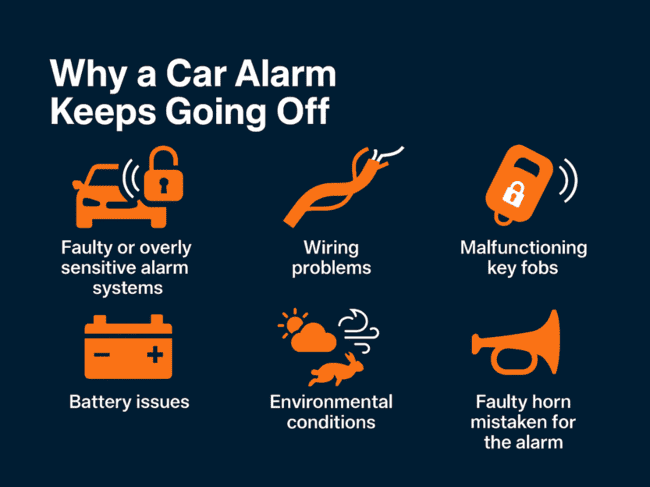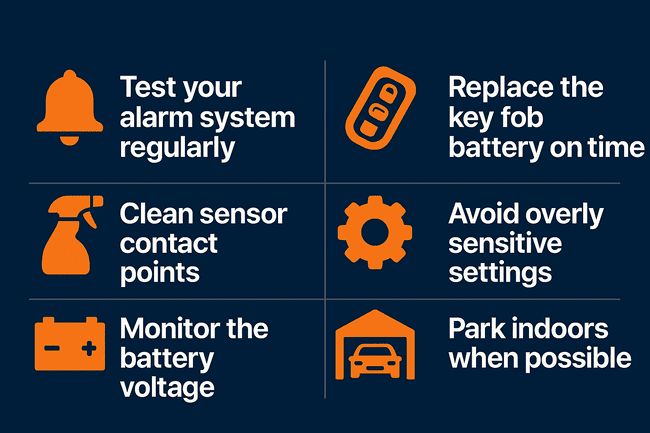Table of Contents
Why your car alarm keeps going off and how to stop it
A properly functioning car alarm is essential for protecting your vehicle from theft and ensuring your peace of mind. However, if your car alarm keeps going off unexpectedly, it can be more than just an annoyance; it can signal underlying issues that need attention. Learn more about the potential causes of car alarm malfunctions and how to solve them below.


Does my car have a factory-fitted alarm and immobiliser?
If you’re unsure whether your car has both an anti-theft alarm and an immobiliser, you can consult the car owner’s manual or check yourself by trying to open one of the car doors after it has been locked.
A mechanic can also take a look if you’re still uncertain. Generally speaking, if your car was made after October 1998, it should have its own immobiliser as well as a car alarm system.
All keyless cars will have some sort of immobiliser as this is required to prevent unauthorised use of the car. The alarm and immobiliser should deactivate when the vehicle receives a signal from the key fob chip when it is nearby or when the driver presses the fob buttons. Find out more about the types of anti-theft systems and how they work in this blog.

Car alarm troubleshooting guide UK
Why does my car alarm keep going off?
If your car alarm keeps going off for no apparent reason, it is most likely due to some kind of electrical fault. For example, it could be due to faulty sensors or wiring that cause the system to detect false threats. Sometimes it happens because the car battery is running low or is flat, or due to a blown fuse. Thankfully, faulty ones are quickly diagnosed, easy to replace and pick up new car fuses. The alarm can also be triggered due to electrical interferences, temperature changes, and extreme weather.
What causes the car alarm to go off?


Faulty or sensitive alarm system – the sensors can go off by themselves if there is a false signal or due to something as small as a heavy gust of wind, parking on an uneven surface, or a small animal brushing against the car.

Wiring problems – if the wires in the alarm system are damaged or frayed, they can create short circuits or inconsistent signals, which can lead to the alarm going off unexpectedly.

Battery faults – a weak or dying car battery can cause fluctuations in the voltage, which might confuse the alarm system into thinking there’s a security breach. If this happens, you should pick up a new car battery.

Key fob malfunctions – electronic devices or signals from nearby sources can interfere with the key fob’s signal, potentially causing the alarm to go off.

Environmental and weather conditions – thunderstorms, heavy rain, and strong winds can cause vibrations or disturbances that set off the alarm.

Animals – windows that are left open, particularly overnight, may allow creatures to get in. Some rodents are attracted to the smell of fuel or the car’s warmth.

Faulty horns – Some may mistake a faulty horn for their alarm. If the horn relay goes bad or the parts are worn, for example, it may go off spontaneously or continuously. If this happens, make sure to install a new car horn unit.
Sold by AUTODOC Sold by AUTODOC Sold by AUTODOC Sold by AUTODOC Sold by AUTODOC 
 BOSCH Horn
12V, 110 dB(A), Electric-pneumatic, 60W, Holder may need adaptation
BOSCH Horn
12V, 110 dB(A), Electric-pneumatic, 60W, Holder may need adaptation
 HELLA Air Horn
HELLA Air Horn

 BOSCH Air Horn
BOSCH Air Horn

Car alarm randomly goes off at night
In addition to common electrical faults, such as a low battery, loose connections and bad sensors, car alarms often go off at night because of extreme weather or the environment. For example, when there is heavy wind or stormy weather, the alarm can be set off, as well as when there are strong vibrations due to heavy traffic and flows of pedestrians.
However, you should also check to make sure that there are definitely no signs of a potential break in or animal activity as this is a time when both thieves and animal invaders are most active.

Diagnostics and solutions
How to diagnose car alarm faults
1. Check for visible disturbances
➡ Signs of break-in or animal invader?
![]() Yes → Investigate further and report if needed.
Yes → Investigate further and report if needed.
![]() No → Go to Step 2.
No → Go to Step 2.
2. Confirm it’s the car alarm
➡ Could it be a faulty horn?
![]() Yes → Inspect horn relay and wiring. Replace horn unit if necessary.
Yes → Inspect horn relay and wiring. Replace horn unit if necessary.
![]() No → Go to Step 3.
No → Go to Step 3.
3. Evaluate battery health
➡ Is the battery weak or old?
![]() Yes → Test battery voltage or visit a mechanic. Replace if the voltage is too low or it’s damaged.
Yes → Test battery voltage or visit a mechanic. Replace if the voltage is too low or it’s damaged.
![]() No → Go to Step 4.
No → Go to Step 4.
4. Inspect key fob functionality
➡ Is the key fob sending false or weak signals?
![]() Yes → Change the battery or reprogramme the fob.
Yes → Change the battery or reprogramme the fob.
![]() No → Go to Step 5.
No → Go to Step 5.
5. Assess environmental factors
➡ Does the alarm go off during bad weather, at night, or when parked on uneven ground?
![]() Yes → Adjust alarm sensitivity if possible (consult manual or mechanic).
Yes → Adjust alarm sensitivity if possible (consult manual or mechanic).
![]() No → Go to Step 6.
No → Go to Step 6.
6. Inspect door, bonnet, and boot sensors
➡ Do any door/bonnet lights stay on or flicker after locking?
![]() Yes → A misaligned or faulty sensor could be triggering the alarm. Clean and adjust sensors or replace them.
Yes → A misaligned or faulty sensor could be triggering the alarm. Clean and adjust sensors or replace them.
![]() No → Go to Step 7.
No → Go to Step 7.
7. Check alarm wiring
➡ Any signs of loose, frayed, or damaged wires in the alarm system?
![]() Yes → Have the wiring repaired or replaced by a technician.
Yes → Have the wiring repaired or replaced by a technician.
![]() No → Go to Step 8.
No → Go to Step 8.
8. Rule out electrical interference
➡ Are there electronic devices or transmitters nearby that could be interfering?
![]() Yes → Move the car to a different location and monitor.
Yes → Move the car to a different location and monitor.
![]() No → Go to Step 9.
No → Go to Step 9.
9. Consult the car manual or a professional
➡ Still can’t identify the issue?
![]() Yes → Time to consult a qualified mechanic or alarm specialist.
Yes → Time to consult a qualified mechanic or alarm specialist.
![]() No → Issue resolved
No → Issue resolved

Maintenance tips

- Test your alarm system regularly
Activate and deactivate the alarm to check if it responds properly and doesn't trigger on its own. - Clean sensor contact points
Dirt and moisture on door or bonnet latches can cause false signals. Gently clean them every few months. - Monitor the battery voltage
A weak or dying car battery is one of the most common triggers for random alarms. Test it twice a year or before winter. - Replace the key fob battery on time
If your remote starts acting up or has delayed responses, change the battery to avoid miscommunication with the alarm. - Avoid overly sensitive settings
If your alarm system allows sensitivity adjustment, set it to a balanced level to avoid false triggers. - Park indoors when possible
This reduces the risk of the alarm going off randomly due to the weather or vibrations.

FAQ
Top products related to this topic:















